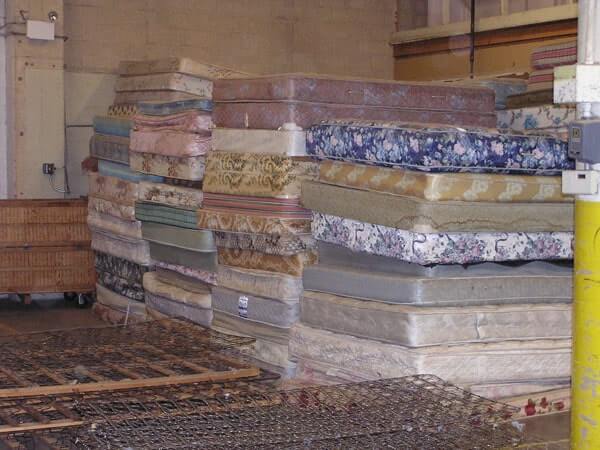Every purchase made online is encrypted with a high level of security you’ve come to expect. Your private information is never shared nor sold, so you can buy with confidence. You can also visit our store if you are in the St. Louis area.

ISPA or better known as The International Sleep Products Association is now putting together a plan for a national solution to an ever-increasing problem to deal with the disposal of mattresses. Used mattress materials like steel, foam, and wood could be recycled in a national program and The International Sleep Products Association is putting forward federal legislation as a solution to a national problem.
An important part of the endeavor would be the formation of a new not for profit Mattress Recycling Council, a volunteer-led group representing various parts of the bedding industry like retailers and manufacturers, government, and enthusiastic consumers. They would be in charge of putting together and developing a healthy and recycling program for the proper disposal and recycling of mattresses officials said.
The Mattress Recycling Program would be sustained by a mattress recovery fee collected during the retail process when mattresses are sold and then passed on to the Mattress Recycling Council. Only legitimate mattress recycling operations would by the recipients of those fees which would support management, oversight, of the administration of the national program for proper disposal and recycling, ISPA said.
One official said that national legislation is extremely important due to the cost strain that has been put on not only states but governments at the local level as well in relation to the disposal of mattresses. Increasing concerns and issues with landfills are forcing some states to take a look at measures dealing with mattress recycling. The concern for ISPA is that state regulation would create a burden on the industry through state regulation and challenging the industry with incurred costs.
ISPA President Ryan Trainer estimates that a modest fee could be collected at the retail level. The organization hopes to examine the idea and determine what such a fee might cost the public.
An upcoming Expo scheduled for March 14-17 in Indianapolis is where proposed legislation is intended to be shared by the industry trade association in additional regional membership meetings are set for the weeks ahead.
Some of the details shared include a way to fight illegitimate mattress scavenging and rebuilding operations which are deemed unhealthy and dangerous to mattress buyers due to their unsanitary nature. Used mattresses also hurt industry reputation something that a national Mattress Recycling Act could help combat.
The new legislation would begin with the U.S. Consumer Product Safety Commission working on setting up a product safety standard on the national level for sale, processing, and uniformed labeling of used and renovated mattresses. Currently, states have different ways of handling the mattress issues because no current national standard is in place allowing ruthless renovators, unscrupulous retailers, and consumer dumping to run rapidly nationwide.
The new recycling program would function along with federal oversight from the U.S. Commerce secretary, and would also supply “an industry-led, efficient solution to the challenge of recycling used mattresses,” ISPA said.
Once a national measure is passed, the national recycling program would only begin after industry members have been able to state their opinions on the planned national recycling solution and have voted on the proposal through a bedding industry-wide referendum.
Approximately 7 years ago there were but a handful of legitimate mattress recovery and recycling operations and today the number has increased to nearly 30. This has been something that ISPA has encouraged.
This is happening none too soon. The industry and consumers have had the issues brought to the forefront in countless blogs, special investigations most notably on Dateline NBC. The common theme in these expose’ are the illegitimate practices of deceitful companies who deceive unsuspecting consumers with unsafe, unhygienic mattresses. Additionally, such practices threaten the industry and they feel they must come up with a way to end this practice to not only protect consumers but also to protect the reputation of the bedding industry.
